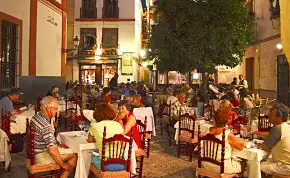Although we perhaps don't realise it, climate has a substantial affect on culture. Have you ever been on holiday in the Mediterranean and thought how nice it is to eat so much later, and sit outside until the early hours with friends and family?

Well, their year round balmy climate facilitates this. It's not something that would be very pleasant to do in the Pacific Northwest in January, but in Madrid or Lisbon for about 10 months a year- it's perfect!
Similarly- think of the way that Northern European countries like Germany and Scandinavia celebrate Christmas with "traditional" festive activities, drinking mulled wine at festive markets with snow and all the trimmings we associate with Christmas. This is completely different than in Australia or New Zealand, where Christmas falls in the middle of summer, and where people want to head to the beach and have BBQ's to celebrate Christmas and the New Year.
Historically, cultures have always adapted to the physical world around them. Ancient gods were used to explain natural phenomenons like thunder and tidal waves, and in dry regions - almost all cultures and belief systems adhered to the practice of offering up sacrifice to encourage rainfall.
In modern days, and even with our ability to understand the natural world and travel across the globe, culture is still intertwined with climate.
Hot afternoons encourages long lunches and siesta and a more leisurely pace, whereas you could argue that the colder climates are difficult to live in and encourage a more weathered approach to life.
